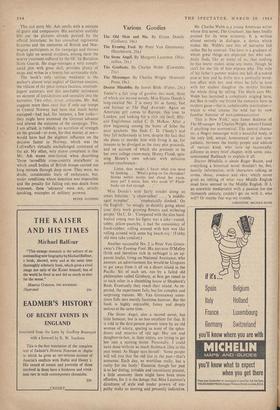Various Goodies
The Old Man and Me. By Elaine Dundy. (Gollancz, 18s.) The Evening Fool. By Peter Van Greenaway. (Hutchinson, 21s.) Doctor Mirabilis. By James Blish. (Faber, 25s.) THERE'S a fair crop of goodies this week, three of which are second novels. Miss Elaine Dundy's long-awaited No. 2 is every bit as funny, fast and furious as The Dud Avocado. Again an American girl comes to Europe, this time to London, and looking for a rich old (well, fifty- six) Englishman called C. D. McKee. After a slow beginning among the bums of Soho the pace quickens She finds C. D. (`Seedy') and they fall lecherously in love, despite the fact that she plans to murder him with living it up, for reasons to be divulged as the zany plot proceeds, and on account of which she pretends to be her own college room-mate, Honey Flood, spin- ning Honey's own sob-tale with delicious author-interference: Listen, dear reader, I know what you must be thinking.... 'What's going on for chrisakes? Stories within stories and about her room- mate yet? I mean, Jeez, who needs it? Flash- backs are bad enough. . .
Miss Dundy's style fairly streaks along on smart felicities: 'a chain-talker' . . . 'a middle- aged nymphet' . . . 'emphatically sloshed.' On the English: 'so smugly so daintily going about your dirty work growing flowers and withering people.' On C. D.: 'Compared with the slim hard- bodied young men his figure was a joke—round, tubby, pillow-paunchy, it had the consistency of foam-rubber; rolling around with him was like rolling around with some big beach-toy.' (Tubby old men take comfort.) Another successful No. 2 is Peter Van Green- away's The Evening Fool. His narrator O'Malley (Irish and therefore rich in verbiage) is an ap- parent loafer, living on National Assistance, who answers an advertisement for would-be Utopians to get away from it all on a desert island in the Pacific. Six of each sex, run by a failed old philosopher called Grisbury, at first get tuned in to each other in a shambling house at Shepherd's Bush. Eventually they reach their island. As ex- pected, the experiment fails, but for complex and surprising reasons. Mr. Van Greenaway some- times falls into merely facetious humour. But the book is highly enjoyable, funny and deeply serious at the same time.
The Stone Angel, also a second novel, has little humour, but is no less excellent for that. It is told in the first-person present tense by an old woman of ninety, sparing us none of the splen- dours and miseries of old age. Her son and daughter-in-law, in their sixties, are trying to get her into a nursing home. Personally, I could have done without so much flashback (this in the past tense). As Hagar says herself: 'Some people will tell you that the old live in the past—that's nonsense. Each day, so worthless really, has a rarity for me lately.' Essential though her past is to her doting, irritable and incontinent present, a little economy there might have been more effective, for it is the dotage that Miss Laurence's directness of style and tender powers of em- pathy make so moving and presently indicative. Mr. Charles Webb is a young American writer whose first novel, The Graduate, has been loudly praised for its terse economy. It is written almost entirely in dialogue, a device which makes Mr. Webb's rare bits of narrative fall rather flat by contrast. The hero is a graduate of whom great things are expected, but who sud- denly finds, like so many of us, that nothing he has learnt makes sense any more, though he can't for the life of him express why. The wife of his father's partner makes one hell of a naked pass at him and he drifts into a comically word- less affair with her, and when he falls in love with her student daughter the mother bitches the whole thing by telling. The blurb says Mr. Webb has launched a completely original hero, but Ben is really our friend the romantic hero in modern guise—that is, unbelievably inarticulate— which is what creates the wild but by now familiar humour of non-communication.
`This is New York,' says James Baldwin of The Messenger by Charles Wright, whom I found if anything too economical. The central charac- ter, a Negro messenger with a beautiful body, is the only link, sexual, homosexual or just sym- pathetic, between the lonely people and addicts of various kinds who turn up laconically, different in every brief chapter, with some, alas, sentimental flashback to explain it all.
Doctor Mirabilis is about Roger Bacon, and everything a historical novel shouldn't be, flat, heavily informative, with characters talking in certes, thous, yonders and ekes, which never givel an inkling of what racy Middle English must have seemed to the Middle English. If 1, an erstwhile mediaevalist with a passion for the thirteenth century, couldn't get on with it, who will? Or maybe that was my trouble.
CHRISTINE BROOKE-ROSE








































 Previous page
Previous page